Research Project: Motivation Schemes Impact on Retention at Next Plc
VerifiedAdded on 2023/06/11
|33
|8352
|317
Project
AI Summary
This research project investigates the impact of staff motivation schemes on employee retention as a talent management strategy within Next Plc. The study aims to examine the effectiveness of these schemes by addressing the conceptual framework of talent management and motivation, identifying specific motivation strategies adopted by Next Plc, and discerning the challenges faced by managers in implementing these strategies. The literature review highlights the importance of talent management in increasing employee performance, attracting talent, and improving overall business outcomes. Data collection and analysis, likely through surveys, will provide insights into the perceptions and experiences of employees regarding motivation and retention within the organization. The research concludes by offering recommendations for Next Plc and suggesting areas for further research, contributing to a better understanding of talent management and motivation in the workplace. This assignment is available on Desklib, a platform offering a wide range of study resources for students.
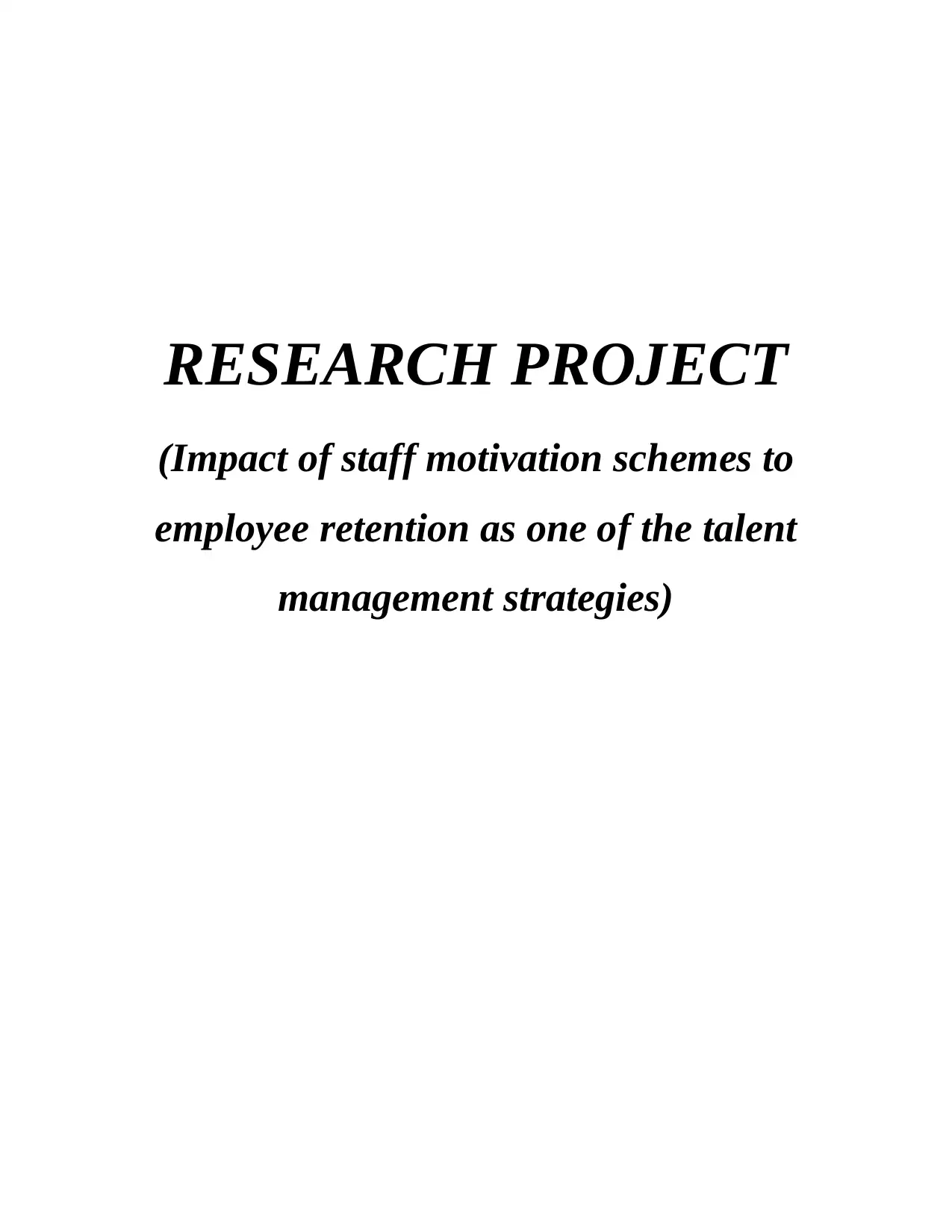
RESEARCH PROJECT
(Impact of staff motivation schemes to
employee retention as one of the talent
management strategies)
(Impact of staff motivation schemes to
employee retention as one of the talent
management strategies)
Paraphrase This Document
Need a fresh take? Get an instant paraphrase of this document with our AI Paraphraser
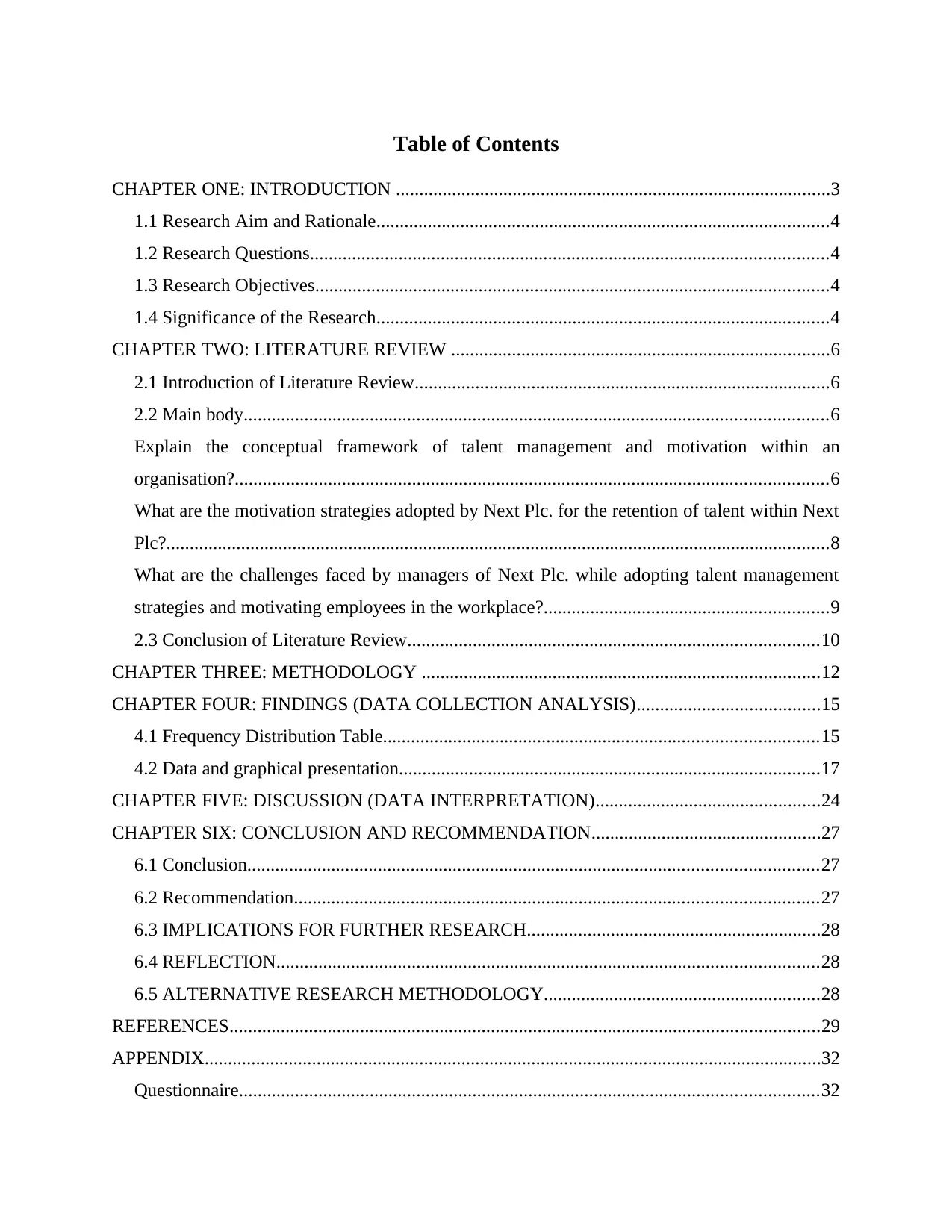
Table of Contents
CHAPTER ONE: INTRODUCTION .............................................................................................3
1.1 Research Aim and Rationale.................................................................................................4
1.2 Research Questions...............................................................................................................4
1.3 Research Objectives..............................................................................................................4
1.4 Significance of the Research.................................................................................................4
CHAPTER TWO: LITERATURE REVIEW .................................................................................6
2.1 Introduction of Literature Review.........................................................................................6
2.2 Main body.............................................................................................................................6
Explain the conceptual framework of talent management and motivation within an
organisation?...............................................................................................................................6
What are the motivation strategies adopted by Next Plc. for the retention of talent within Next
Plc?..............................................................................................................................................8
What are the challenges faced by managers of Next Plc. while adopting talent management
strategies and motivating employees in the workplace?.............................................................9
2.3 Conclusion of Literature Review........................................................................................10
CHAPTER THREE: METHODOLOGY .....................................................................................12
CHAPTER FOUR: FINDINGS (DATA COLLECTION ANALYSIS).......................................15
4.1 Frequency Distribution Table.............................................................................................15
4.2 Data and graphical presentation..........................................................................................17
CHAPTER FIVE: DISCUSSION (DATA INTERPRETATION)................................................24
CHAPTER SIX: CONCLUSION AND RECOMMENDATION.................................................27
6.1 Conclusion..........................................................................................................................27
6.2 Recommendation................................................................................................................27
6.3 IMPLICATIONS FOR FURTHER RESEARCH...............................................................28
6.4 REFLECTION....................................................................................................................28
6.5 ALTERNATIVE RESEARCH METHODOLOGY...........................................................28
REFERENCES..............................................................................................................................29
APPENDIX....................................................................................................................................32
Questionnaire............................................................................................................................32
CHAPTER ONE: INTRODUCTION .............................................................................................3
1.1 Research Aim and Rationale.................................................................................................4
1.2 Research Questions...............................................................................................................4
1.3 Research Objectives..............................................................................................................4
1.4 Significance of the Research.................................................................................................4
CHAPTER TWO: LITERATURE REVIEW .................................................................................6
2.1 Introduction of Literature Review.........................................................................................6
2.2 Main body.............................................................................................................................6
Explain the conceptual framework of talent management and motivation within an
organisation?...............................................................................................................................6
What are the motivation strategies adopted by Next Plc. for the retention of talent within Next
Plc?..............................................................................................................................................8
What are the challenges faced by managers of Next Plc. while adopting talent management
strategies and motivating employees in the workplace?.............................................................9
2.3 Conclusion of Literature Review........................................................................................10
CHAPTER THREE: METHODOLOGY .....................................................................................12
CHAPTER FOUR: FINDINGS (DATA COLLECTION ANALYSIS).......................................15
4.1 Frequency Distribution Table.............................................................................................15
4.2 Data and graphical presentation..........................................................................................17
CHAPTER FIVE: DISCUSSION (DATA INTERPRETATION)................................................24
CHAPTER SIX: CONCLUSION AND RECOMMENDATION.................................................27
6.1 Conclusion..........................................................................................................................27
6.2 Recommendation................................................................................................................27
6.3 IMPLICATIONS FOR FURTHER RESEARCH...............................................................28
6.4 REFLECTION....................................................................................................................28
6.5 ALTERNATIVE RESEARCH METHODOLOGY...........................................................28
REFERENCES..............................................................................................................................29
APPENDIX....................................................................................................................................32
Questionnaire............................................................................................................................32
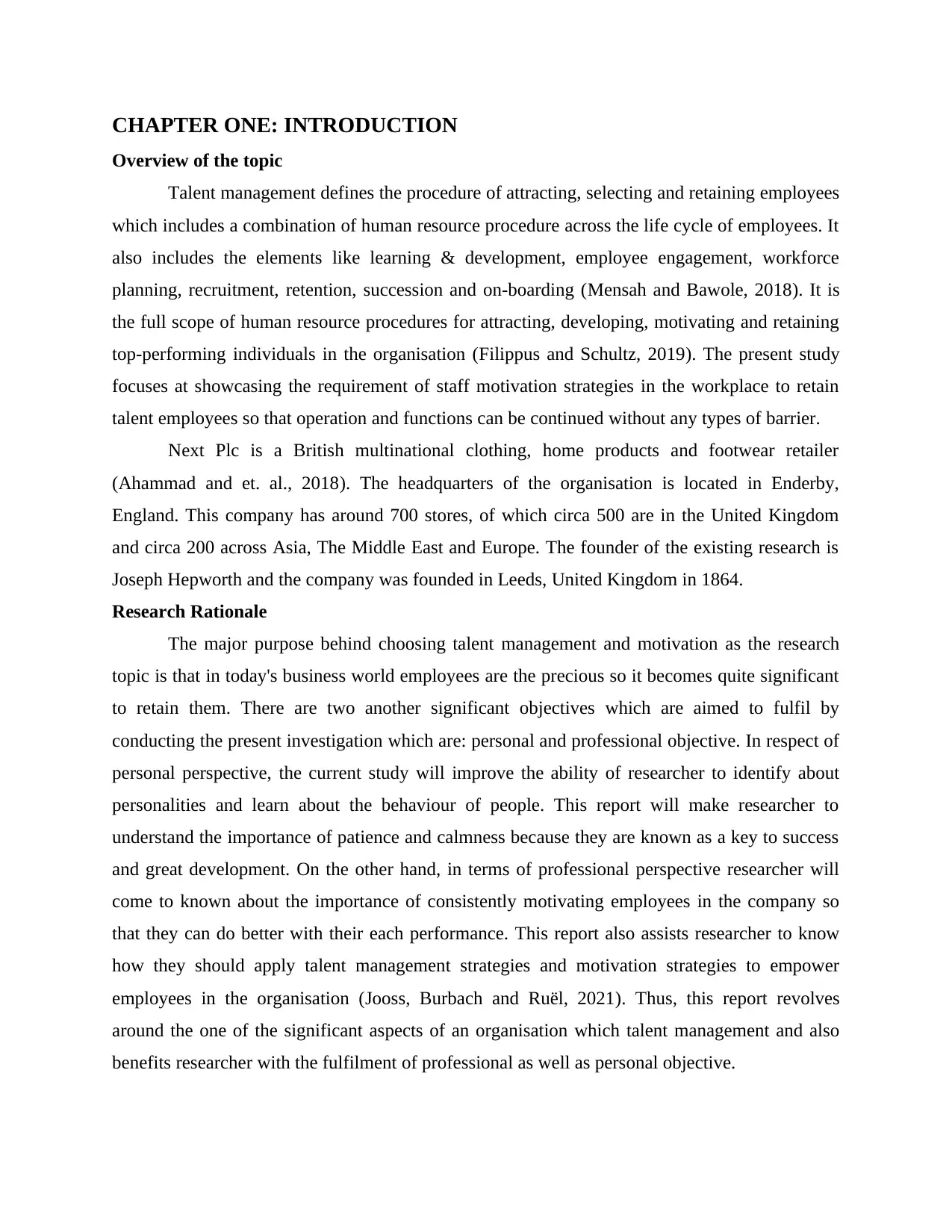
CHAPTER ONE: INTRODUCTION
Overview of the topic
Talent management defines the procedure of attracting, selecting and retaining employees
which includes a combination of human resource procedure across the life cycle of employees. It
also includes the elements like learning & development, employee engagement, workforce
planning, recruitment, retention, succession and on-boarding (Mensah and Bawole, 2018). It is
the full scope of human resource procedures for attracting, developing, motivating and retaining
top-performing individuals in the organisation (Filippus and Schultz, 2019). The present study
focuses at showcasing the requirement of staff motivation strategies in the workplace to retain
talent employees so that operation and functions can be continued without any types of barrier.
Next Plc is a British multinational clothing, home products and footwear retailer
(Ahammad and et. al., 2018). The headquarters of the organisation is located in Enderby,
England. This company has around 700 stores, of which circa 500 are in the United Kingdom
and circa 200 across Asia, The Middle East and Europe. The founder of the existing research is
Joseph Hepworth and the company was founded in Leeds, United Kingdom in 1864.
Research Rationale
The major purpose behind choosing talent management and motivation as the research
topic is that in today's business world employees are the precious so it becomes quite significant
to retain them. There are two another significant objectives which are aimed to fulfil by
conducting the present investigation which are: personal and professional objective. In respect of
personal perspective, the current study will improve the ability of researcher to identify about
personalities and learn about the behaviour of people. This report will make researcher to
understand the importance of patience and calmness because they are known as a key to success
and great development. On the other hand, in terms of professional perspective researcher will
come to known about the importance of consistently motivating employees in the company so
that they can do better with their each performance. This report also assists researcher to know
how they should apply talent management strategies and motivation strategies to empower
employees in the organisation (Jooss, Burbach and Ruël, 2021). Thus, this report revolves
around the one of the significant aspects of an organisation which talent management and also
benefits researcher with the fulfilment of professional as well as personal objective.
Overview of the topic
Talent management defines the procedure of attracting, selecting and retaining employees
which includes a combination of human resource procedure across the life cycle of employees. It
also includes the elements like learning & development, employee engagement, workforce
planning, recruitment, retention, succession and on-boarding (Mensah and Bawole, 2018). It is
the full scope of human resource procedures for attracting, developing, motivating and retaining
top-performing individuals in the organisation (Filippus and Schultz, 2019). The present study
focuses at showcasing the requirement of staff motivation strategies in the workplace to retain
talent employees so that operation and functions can be continued without any types of barrier.
Next Plc is a British multinational clothing, home products and footwear retailer
(Ahammad and et. al., 2018). The headquarters of the organisation is located in Enderby,
England. This company has around 700 stores, of which circa 500 are in the United Kingdom
and circa 200 across Asia, The Middle East and Europe. The founder of the existing research is
Joseph Hepworth and the company was founded in Leeds, United Kingdom in 1864.
Research Rationale
The major purpose behind choosing talent management and motivation as the research
topic is that in today's business world employees are the precious so it becomes quite significant
to retain them. There are two another significant objectives which are aimed to fulfil by
conducting the present investigation which are: personal and professional objective. In respect of
personal perspective, the current study will improve the ability of researcher to identify about
personalities and learn about the behaviour of people. This report will make researcher to
understand the importance of patience and calmness because they are known as a key to success
and great development. On the other hand, in terms of professional perspective researcher will
come to known about the importance of consistently motivating employees in the company so
that they can do better with their each performance. This report also assists researcher to know
how they should apply talent management strategies and motivation strategies to empower
employees in the organisation (Jooss, Burbach and Ruël, 2021). Thus, this report revolves
around the one of the significant aspects of an organisation which talent management and also
benefits researcher with the fulfilment of professional as well as personal objective.
⊘ This is a preview!⊘
Do you want full access?
Subscribe today to unlock all pages.

Trusted by 1+ million students worldwide
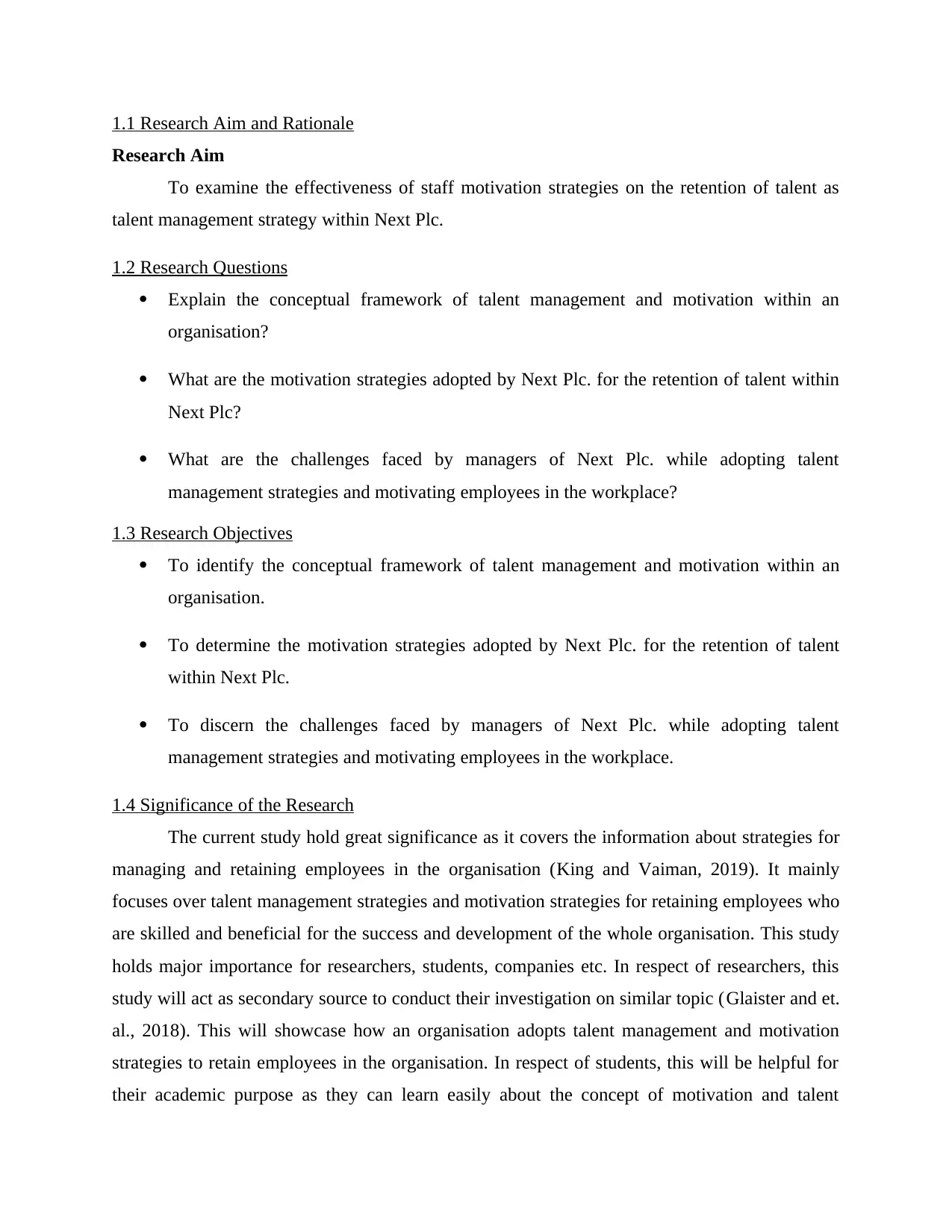
1.1 Research Aim and Rationale
Research Aim
To examine the effectiveness of staff motivation strategies on the retention of talent as
talent management strategy within Next Plc.
1.2 Research Questions
Explain the conceptual framework of talent management and motivation within an
organisation?
What are the motivation strategies adopted by Next Plc. for the retention of talent within
Next Plc?
What are the challenges faced by managers of Next Plc. while adopting talent
management strategies and motivating employees in the workplace?
1.3 Research Objectives
To identify the conceptual framework of talent management and motivation within an
organisation.
To determine the motivation strategies adopted by Next Plc. for the retention of talent
within Next Plc.
To discern the challenges faced by managers of Next Plc. while adopting talent
management strategies and motivating employees in the workplace.
1.4 Significance of the Research
The current study hold great significance as it covers the information about strategies for
managing and retaining employees in the organisation (King and Vaiman, 2019). It mainly
focuses over talent management strategies and motivation strategies for retaining employees who
are skilled and beneficial for the success and development of the whole organisation. This study
holds major importance for researchers, students, companies etc. In respect of researchers, this
study will act as secondary source to conduct their investigation on similar topic (Glaister and et.
al., 2018). This will showcase how an organisation adopts talent management and motivation
strategies to retain employees in the organisation. In respect of students, this will be helpful for
their academic purpose as they can learn easily about the concept of motivation and talent
Research Aim
To examine the effectiveness of staff motivation strategies on the retention of talent as
talent management strategy within Next Plc.
1.2 Research Questions
Explain the conceptual framework of talent management and motivation within an
organisation?
What are the motivation strategies adopted by Next Plc. for the retention of talent within
Next Plc?
What are the challenges faced by managers of Next Plc. while adopting talent
management strategies and motivating employees in the workplace?
1.3 Research Objectives
To identify the conceptual framework of talent management and motivation within an
organisation.
To determine the motivation strategies adopted by Next Plc. for the retention of talent
within Next Plc.
To discern the challenges faced by managers of Next Plc. while adopting talent
management strategies and motivating employees in the workplace.
1.4 Significance of the Research
The current study hold great significance as it covers the information about strategies for
managing and retaining employees in the organisation (King and Vaiman, 2019). It mainly
focuses over talent management strategies and motivation strategies for retaining employees who
are skilled and beneficial for the success and development of the whole organisation. This study
holds major importance for researchers, students, companies etc. In respect of researchers, this
study will act as secondary source to conduct their investigation on similar topic (Glaister and et.
al., 2018). This will showcase how an organisation adopts talent management and motivation
strategies to retain employees in the organisation. In respect of students, this will be helpful for
their academic purpose as they can learn easily about the concept of motivation and talent
Paraphrase This Document
Need a fresh take? Get an instant paraphrase of this document with our AI Paraphraser

management within an organisation. This study is also very useful for companies as they can
easily determine how large scale companies like Next Plc is using talent management and
motivation strategies in the workplace.
easily determine how large scale companies like Next Plc is using talent management and
motivation strategies in the workplace.
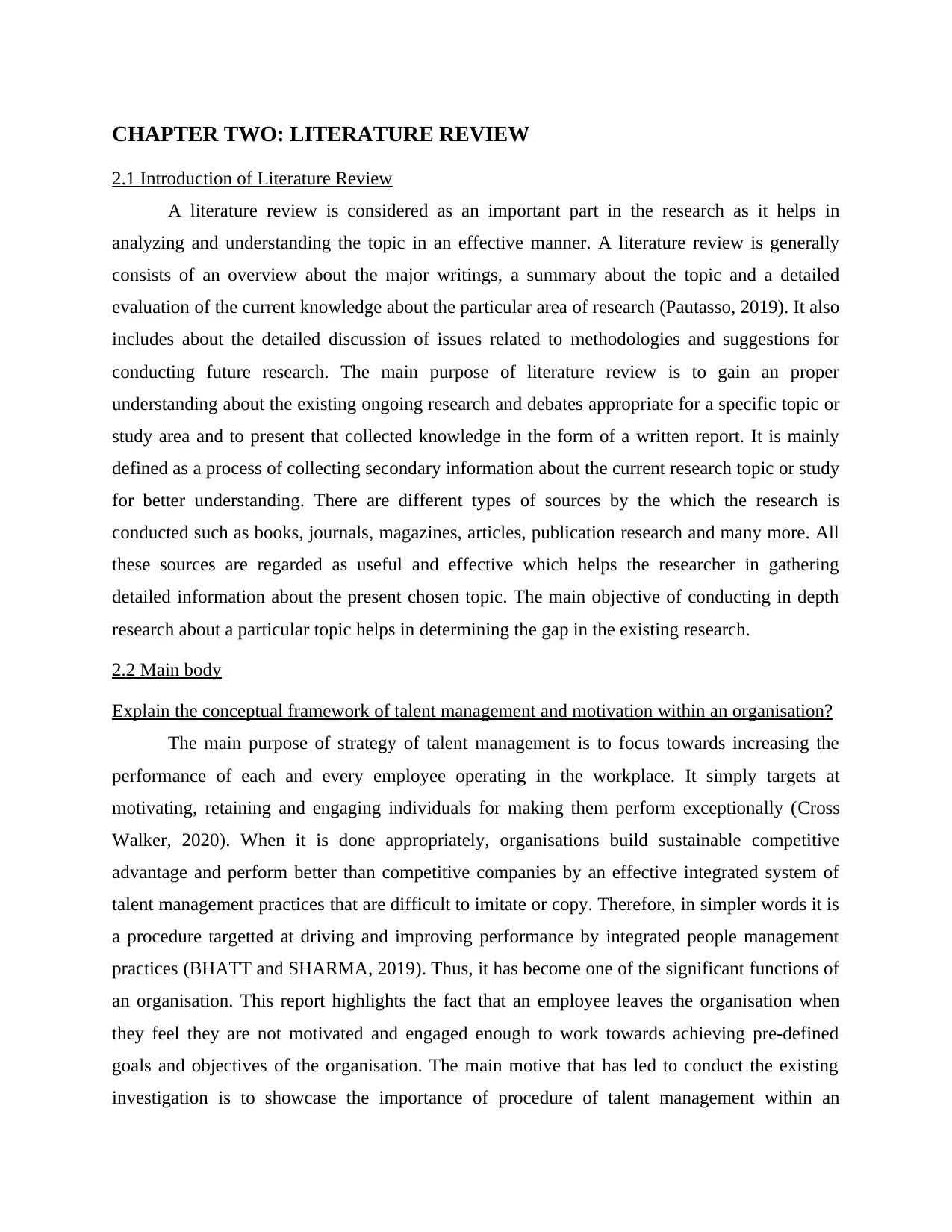
CHAPTER TWO: LITERATURE REVIEW
2.1 Introduction of Literature Review
A literature review is considered as an important part in the research as it helps in
analyzing and understanding the topic in an effective manner. A literature review is generally
consists of an overview about the major writings, a summary about the topic and a detailed
evaluation of the current knowledge about the particular area of research (Pautasso, 2019). It also
includes about the detailed discussion of issues related to methodologies and suggestions for
conducting future research. The main purpose of literature review is to gain an proper
understanding about the existing ongoing research and debates appropriate for a specific topic or
study area and to present that collected knowledge in the form of a written report. It is mainly
defined as a process of collecting secondary information about the current research topic or study
for better understanding. There are different types of sources by the which the research is
conducted such as books, journals, magazines, articles, publication research and many more. All
these sources are regarded as useful and effective which helps the researcher in gathering
detailed information about the present chosen topic. The main objective of conducting in depth
research about a particular topic helps in determining the gap in the existing research.
2.2 Main body
Explain the conceptual framework of talent management and motivation within an organisation?
The main purpose of strategy of talent management is to focus towards increasing the
performance of each and every employee operating in the workplace. It simply targets at
motivating, retaining and engaging individuals for making them perform exceptionally (Cross
Walker, 2020). When it is done appropriately, organisations build sustainable competitive
advantage and perform better than competitive companies by an effective integrated system of
talent management practices that are difficult to imitate or copy. Therefore, in simpler words it is
a procedure targetted at driving and improving performance by integrated people management
practices (BHATT and SHARMA, 2019). Thus, it has become one of the significant functions of
an organisation. This report highlights the fact that an employee leaves the organisation when
they feel they are not motivated and engaged enough to work towards achieving pre-defined
goals and objectives of the organisation. The main motive that has led to conduct the existing
investigation is to showcase the importance of procedure of talent management within an
2.1 Introduction of Literature Review
A literature review is considered as an important part in the research as it helps in
analyzing and understanding the topic in an effective manner. A literature review is generally
consists of an overview about the major writings, a summary about the topic and a detailed
evaluation of the current knowledge about the particular area of research (Pautasso, 2019). It also
includes about the detailed discussion of issues related to methodologies and suggestions for
conducting future research. The main purpose of literature review is to gain an proper
understanding about the existing ongoing research and debates appropriate for a specific topic or
study area and to present that collected knowledge in the form of a written report. It is mainly
defined as a process of collecting secondary information about the current research topic or study
for better understanding. There are different types of sources by the which the research is
conducted such as books, journals, magazines, articles, publication research and many more. All
these sources are regarded as useful and effective which helps the researcher in gathering
detailed information about the present chosen topic. The main objective of conducting in depth
research about a particular topic helps in determining the gap in the existing research.
2.2 Main body
Explain the conceptual framework of talent management and motivation within an organisation?
The main purpose of strategy of talent management is to focus towards increasing the
performance of each and every employee operating in the workplace. It simply targets at
motivating, retaining and engaging individuals for making them perform exceptionally (Cross
Walker, 2020). When it is done appropriately, organisations build sustainable competitive
advantage and perform better than competitive companies by an effective integrated system of
talent management practices that are difficult to imitate or copy. Therefore, in simpler words it is
a procedure targetted at driving and improving performance by integrated people management
practices (BHATT and SHARMA, 2019). Thus, it has become one of the significant functions of
an organisation. This report highlights the fact that an employee leaves the organisation when
they feel they are not motivated and engaged enough to work towards achieving pre-defined
goals and objectives of the organisation. The main motive that has led to conduct the existing
investigation is to showcase the importance of procedure of talent management within an
⊘ This is a preview!⊘
Do you want full access?
Subscribe today to unlock all pages.

Trusted by 1+ million students worldwide
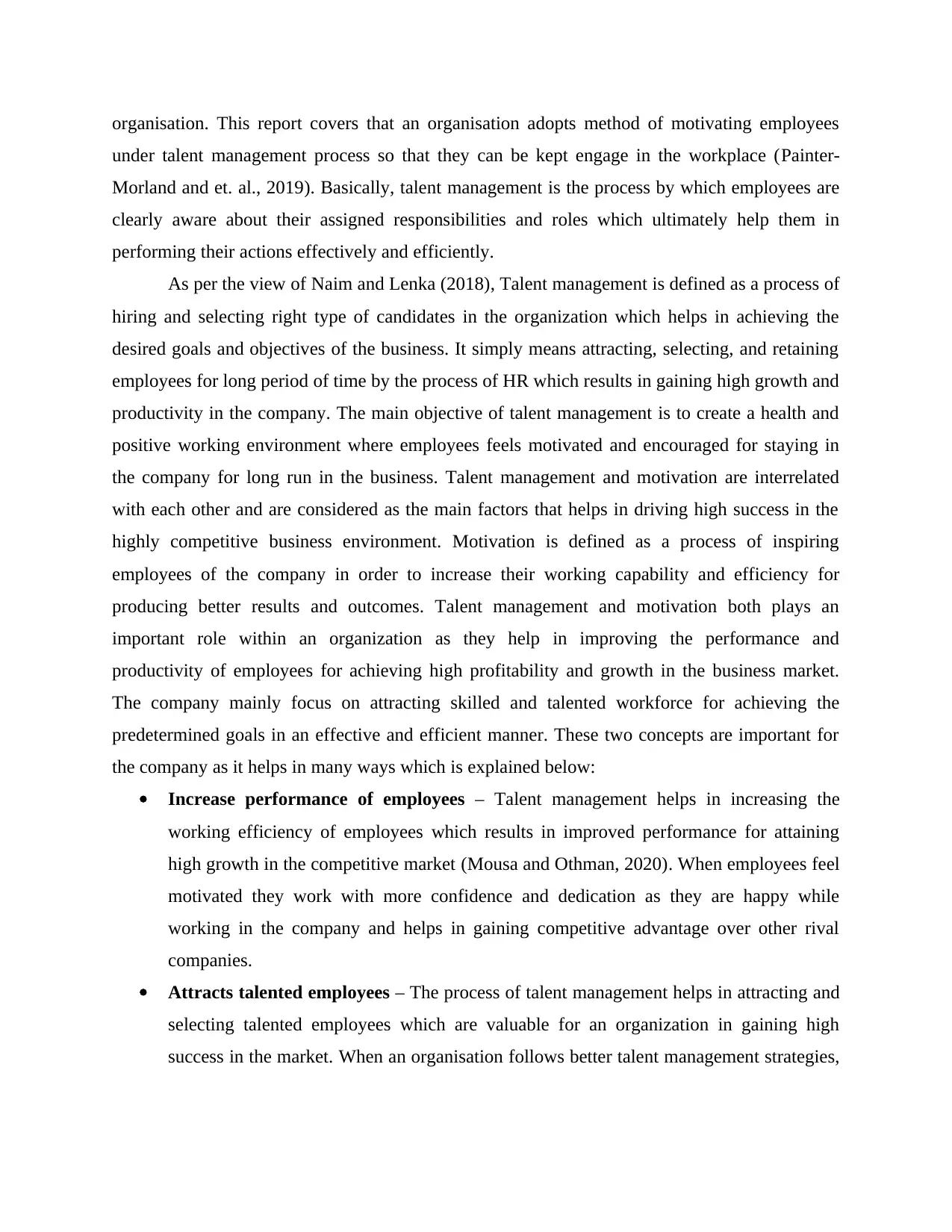
organisation. This report covers that an organisation adopts method of motivating employees
under talent management process so that they can be kept engage in the workplace (Painter‐
Morland and et. al., 2019). Basically, talent management is the process by which employees are
clearly aware about their assigned responsibilities and roles which ultimately help them in
performing their actions effectively and efficiently.
As per the view of Naim and Lenka (2018), Talent management is defined as a process of
hiring and selecting right type of candidates in the organization which helps in achieving the
desired goals and objectives of the business. It simply means attracting, selecting, and retaining
employees for long period of time by the process of HR which results in gaining high growth and
productivity in the company. The main objective of talent management is to create a health and
positive working environment where employees feels motivated and encouraged for staying in
the company for long run in the business. Talent management and motivation are interrelated
with each other and are considered as the main factors that helps in driving high success in the
highly competitive business environment. Motivation is defined as a process of inspiring
employees of the company in order to increase their working capability and efficiency for
producing better results and outcomes. Talent management and motivation both plays an
important role within an organization as they help in improving the performance and
productivity of employees for achieving high profitability and growth in the business market.
The company mainly focus on attracting skilled and talented workforce for achieving the
predetermined goals in an effective and efficient manner. These two concepts are important for
the company as it helps in many ways which is explained below:
Increase performance of employees – Talent management helps in increasing the
working efficiency of employees which results in improved performance for attaining
high growth in the competitive market (Mousa and Othman, 2020). When employees feel
motivated they work with more confidence and dedication as they are happy while
working in the company and helps in gaining competitive advantage over other rival
companies.
Attracts talented employees – The process of talent management helps in attracting and
selecting talented employees which are valuable for an organization in gaining high
success in the market. When an organisation follows better talent management strategies,
under talent management process so that they can be kept engage in the workplace (Painter‐
Morland and et. al., 2019). Basically, talent management is the process by which employees are
clearly aware about their assigned responsibilities and roles which ultimately help them in
performing their actions effectively and efficiently.
As per the view of Naim and Lenka (2018), Talent management is defined as a process of
hiring and selecting right type of candidates in the organization which helps in achieving the
desired goals and objectives of the business. It simply means attracting, selecting, and retaining
employees for long period of time by the process of HR which results in gaining high growth and
productivity in the company. The main objective of talent management is to create a health and
positive working environment where employees feels motivated and encouraged for staying in
the company for long run in the business. Talent management and motivation are interrelated
with each other and are considered as the main factors that helps in driving high success in the
highly competitive business environment. Motivation is defined as a process of inspiring
employees of the company in order to increase their working capability and efficiency for
producing better results and outcomes. Talent management and motivation both plays an
important role within an organization as they help in improving the performance and
productivity of employees for achieving high profitability and growth in the business market.
The company mainly focus on attracting skilled and talented workforce for achieving the
predetermined goals in an effective and efficient manner. These two concepts are important for
the company as it helps in many ways which is explained below:
Increase performance of employees – Talent management helps in increasing the
working efficiency of employees which results in improved performance for attaining
high growth in the competitive market (Mousa and Othman, 2020). When employees feel
motivated they work with more confidence and dedication as they are happy while
working in the company and helps in gaining competitive advantage over other rival
companies.
Attracts talented employees – The process of talent management helps in attracting and
selecting talented employees which are valuable for an organization in gaining high
success in the market. When an organisation follows better talent management strategies,
Paraphrase This Document
Need a fresh take? Get an instant paraphrase of this document with our AI Paraphraser
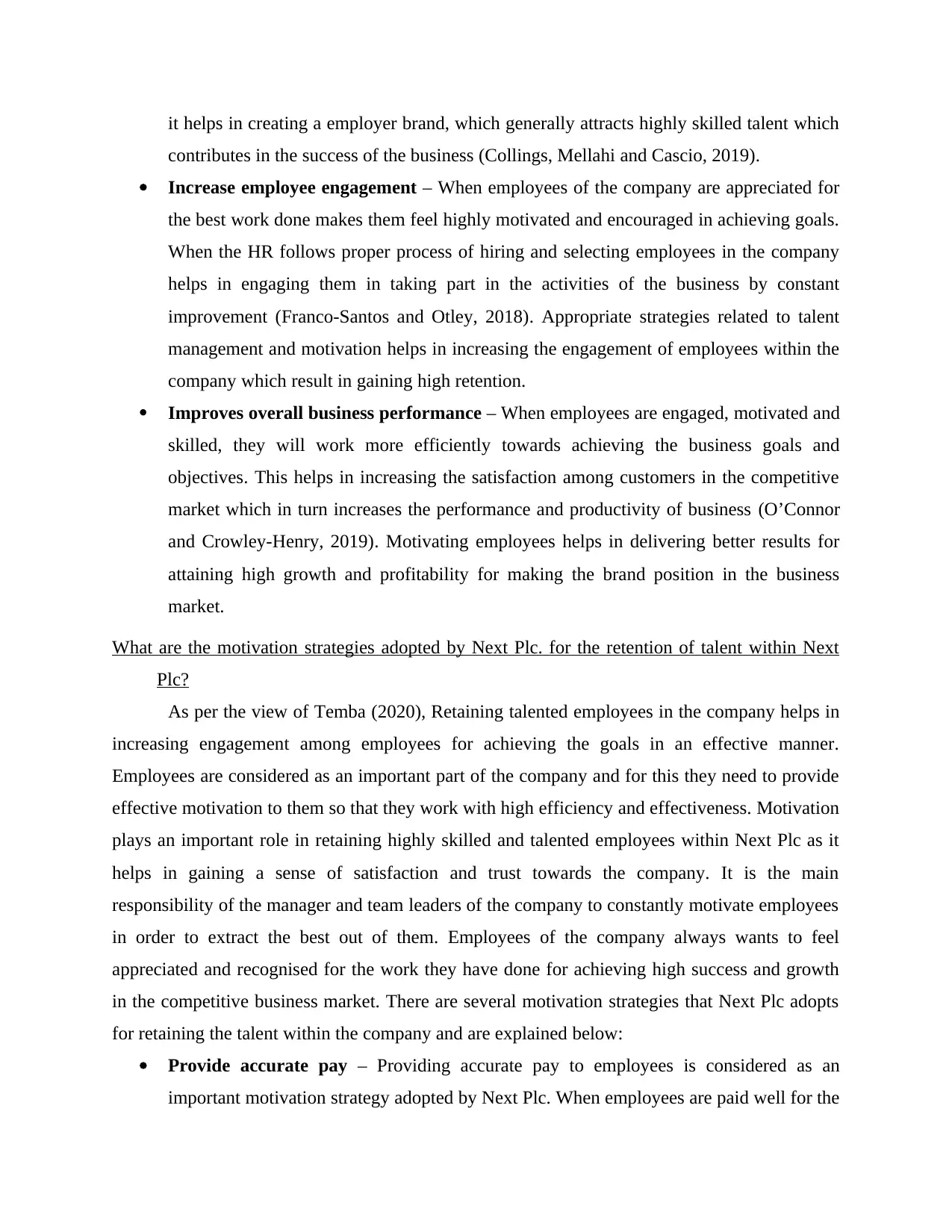
it helps in creating a employer brand, which generally attracts highly skilled talent which
contributes in the success of the business (Collings, Mellahi and Cascio, 2019).
Increase employee engagement – When employees of the company are appreciated for
the best work done makes them feel highly motivated and encouraged in achieving goals.
When the HR follows proper process of hiring and selecting employees in the company
helps in engaging them in taking part in the activities of the business by constant
improvement (Franco‐Santos and Otley, 2018). Appropriate strategies related to talent
management and motivation helps in increasing the engagement of employees within the
company which result in gaining high retention.
Improves overall business performance – When employees are engaged, motivated and
skilled, they will work more efficiently towards achieving the business goals and
objectives. This helps in increasing the satisfaction among customers in the competitive
market which in turn increases the performance and productivity of business (O’Connor
and Crowley-Henry, 2019). Motivating employees helps in delivering better results for
attaining high growth and profitability for making the brand position in the business
market.
What are the motivation strategies adopted by Next Plc. for the retention of talent within Next
Plc?
As per the view of Temba (2020), Retaining talented employees in the company helps in
increasing engagement among employees for achieving the goals in an effective manner.
Employees are considered as an important part of the company and for this they need to provide
effective motivation to them so that they work with high efficiency and effectiveness. Motivation
plays an important role in retaining highly skilled and talented employees within Next Plc as it
helps in gaining a sense of satisfaction and trust towards the company. It is the main
responsibility of the manager and team leaders of the company to constantly motivate employees
in order to extract the best out of them. Employees of the company always wants to feel
appreciated and recognised for the work they have done for achieving high success and growth
in the competitive business market. There are several motivation strategies that Next Plc adopts
for retaining the talent within the company and are explained below:
Provide accurate pay – Providing accurate pay to employees is considered as an
important motivation strategy adopted by Next Plc. When employees are paid well for the
contributes in the success of the business (Collings, Mellahi and Cascio, 2019).
Increase employee engagement – When employees of the company are appreciated for
the best work done makes them feel highly motivated and encouraged in achieving goals.
When the HR follows proper process of hiring and selecting employees in the company
helps in engaging them in taking part in the activities of the business by constant
improvement (Franco‐Santos and Otley, 2018). Appropriate strategies related to talent
management and motivation helps in increasing the engagement of employees within the
company which result in gaining high retention.
Improves overall business performance – When employees are engaged, motivated and
skilled, they will work more efficiently towards achieving the business goals and
objectives. This helps in increasing the satisfaction among customers in the competitive
market which in turn increases the performance and productivity of business (O’Connor
and Crowley-Henry, 2019). Motivating employees helps in delivering better results for
attaining high growth and profitability for making the brand position in the business
market.
What are the motivation strategies adopted by Next Plc. for the retention of talent within Next
Plc?
As per the view of Temba (2020), Retaining talented employees in the company helps in
increasing engagement among employees for achieving the goals in an effective manner.
Employees are considered as an important part of the company and for this they need to provide
effective motivation to them so that they work with high efficiency and effectiveness. Motivation
plays an important role in retaining highly skilled and talented employees within Next Plc as it
helps in gaining a sense of satisfaction and trust towards the company. It is the main
responsibility of the manager and team leaders of the company to constantly motivate employees
in order to extract the best out of them. Employees of the company always wants to feel
appreciated and recognised for the work they have done for achieving high success and growth
in the competitive business market. There are several motivation strategies that Next Plc adopts
for retaining the talent within the company and are explained below:
Provide accurate pay – Providing accurate pay to employees is considered as an
important motivation strategy adopted by Next Plc. When employees are paid well for the
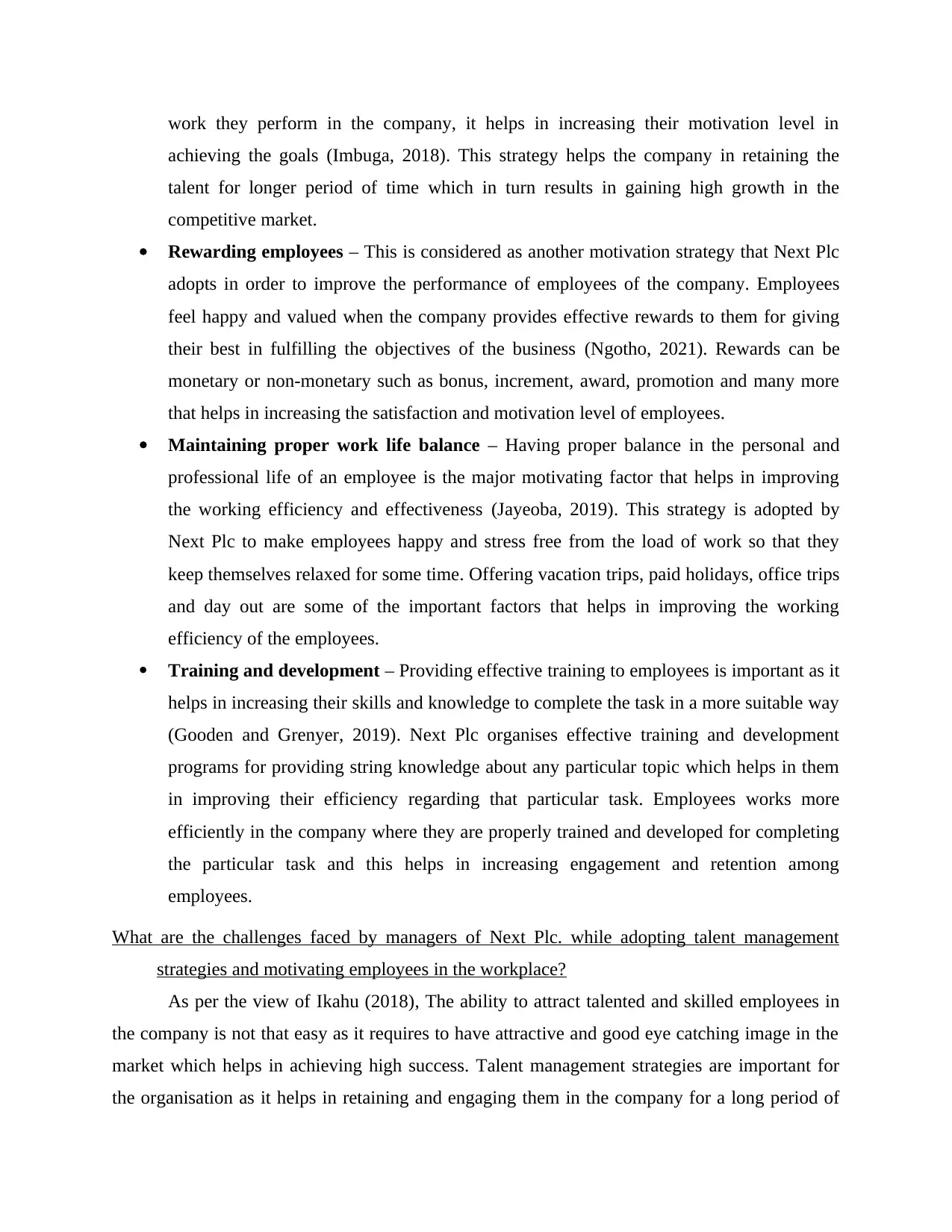
work they perform in the company, it helps in increasing their motivation level in
achieving the goals (Imbuga, 2018). This strategy helps the company in retaining the
talent for longer period of time which in turn results in gaining high growth in the
competitive market.
Rewarding employees – This is considered as another motivation strategy that Next Plc
adopts in order to improve the performance of employees of the company. Employees
feel happy and valued when the company provides effective rewards to them for giving
their best in fulfilling the objectives of the business (Ngotho, 2021). Rewards can be
monetary or non-monetary such as bonus, increment, award, promotion and many more
that helps in increasing the satisfaction and motivation level of employees.
Maintaining proper work life balance – Having proper balance in the personal and
professional life of an employee is the major motivating factor that helps in improving
the working efficiency and effectiveness (Jayeoba, 2019). This strategy is adopted by
Next Plc to make employees happy and stress free from the load of work so that they
keep themselves relaxed for some time. Offering vacation trips, paid holidays, office trips
and day out are some of the important factors that helps in improving the working
efficiency of the employees.
Training and development – Providing effective training to employees is important as it
helps in increasing their skills and knowledge to complete the task in a more suitable way
(Gooden and Grenyer, 2019). Next Plc organises effective training and development
programs for providing string knowledge about any particular topic which helps in them
in improving their efficiency regarding that particular task. Employees works more
efficiently in the company where they are properly trained and developed for completing
the particular task and this helps in increasing engagement and retention among
employees.
What are the challenges faced by managers of Next Plc. while adopting talent management
strategies and motivating employees in the workplace?
As per the view of Ikahu (2018), The ability to attract talented and skilled employees in
the company is not that easy as it requires to have attractive and good eye catching image in the
market which helps in achieving high success. Talent management strategies are important for
the organisation as it helps in retaining and engaging them in the company for a long period of
achieving the goals (Imbuga, 2018). This strategy helps the company in retaining the
talent for longer period of time which in turn results in gaining high growth in the
competitive market.
Rewarding employees – This is considered as another motivation strategy that Next Plc
adopts in order to improve the performance of employees of the company. Employees
feel happy and valued when the company provides effective rewards to them for giving
their best in fulfilling the objectives of the business (Ngotho, 2021). Rewards can be
monetary or non-monetary such as bonus, increment, award, promotion and many more
that helps in increasing the satisfaction and motivation level of employees.
Maintaining proper work life balance – Having proper balance in the personal and
professional life of an employee is the major motivating factor that helps in improving
the working efficiency and effectiveness (Jayeoba, 2019). This strategy is adopted by
Next Plc to make employees happy and stress free from the load of work so that they
keep themselves relaxed for some time. Offering vacation trips, paid holidays, office trips
and day out are some of the important factors that helps in improving the working
efficiency of the employees.
Training and development – Providing effective training to employees is important as it
helps in increasing their skills and knowledge to complete the task in a more suitable way
(Gooden and Grenyer, 2019). Next Plc organises effective training and development
programs for providing string knowledge about any particular topic which helps in them
in improving their efficiency regarding that particular task. Employees works more
efficiently in the company where they are properly trained and developed for completing
the particular task and this helps in increasing engagement and retention among
employees.
What are the challenges faced by managers of Next Plc. while adopting talent management
strategies and motivating employees in the workplace?
As per the view of Ikahu (2018), The ability to attract talented and skilled employees in
the company is not that easy as it requires to have attractive and good eye catching image in the
market which helps in achieving high success. Talent management strategies are important for
the organisation as it helps in retaining and engaging them in the company for a long period of
⊘ This is a preview!⊘
Do you want full access?
Subscribe today to unlock all pages.

Trusted by 1+ million students worldwide
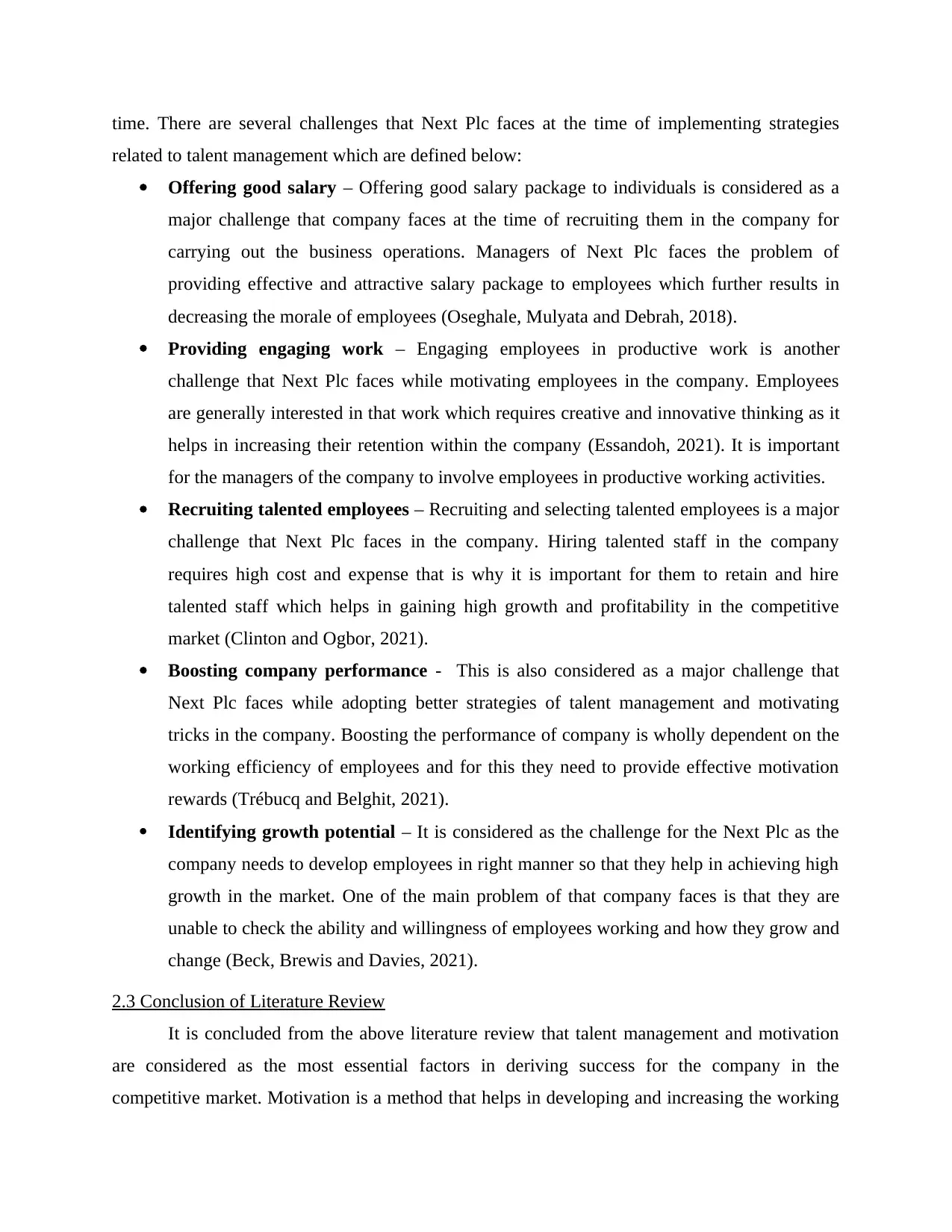
time. There are several challenges that Next Plc faces at the time of implementing strategies
related to talent management which are defined below:
Offering good salary – Offering good salary package to individuals is considered as a
major challenge that company faces at the time of recruiting them in the company for
carrying out the business operations. Managers of Next Plc faces the problem of
providing effective and attractive salary package to employees which further results in
decreasing the morale of employees (Oseghale, Mulyata and Debrah, 2018).
Providing engaging work – Engaging employees in productive work is another
challenge that Next Plc faces while motivating employees in the company. Employees
are generally interested in that work which requires creative and innovative thinking as it
helps in increasing their retention within the company (Essandoh, 2021). It is important
for the managers of the company to involve employees in productive working activities.
Recruiting talented employees – Recruiting and selecting talented employees is a major
challenge that Next Plc faces in the company. Hiring talented staff in the company
requires high cost and expense that is why it is important for them to retain and hire
talented staff which helps in gaining high growth and profitability in the competitive
market (Clinton and Ogbor, 2021).
Boosting company performance - This is also considered as a major challenge that
Next Plc faces while adopting better strategies of talent management and motivating
tricks in the company. Boosting the performance of company is wholly dependent on the
working efficiency of employees and for this they need to provide effective motivation
rewards (Trébucq and Belghit, 2021).
Identifying growth potential – It is considered as the challenge for the Next Plc as the
company needs to develop employees in right manner so that they help in achieving high
growth in the market. One of the main problem of that company faces is that they are
unable to check the ability and willingness of employees working and how they grow and
change (Beck, Brewis and Davies, 2021).
2.3 Conclusion of Literature Review
It is concluded from the above literature review that talent management and motivation
are considered as the most essential factors in deriving success for the company in the
competitive market. Motivation is a method that helps in developing and increasing the working
related to talent management which are defined below:
Offering good salary – Offering good salary package to individuals is considered as a
major challenge that company faces at the time of recruiting them in the company for
carrying out the business operations. Managers of Next Plc faces the problem of
providing effective and attractive salary package to employees which further results in
decreasing the morale of employees (Oseghale, Mulyata and Debrah, 2018).
Providing engaging work – Engaging employees in productive work is another
challenge that Next Plc faces while motivating employees in the company. Employees
are generally interested in that work which requires creative and innovative thinking as it
helps in increasing their retention within the company (Essandoh, 2021). It is important
for the managers of the company to involve employees in productive working activities.
Recruiting talented employees – Recruiting and selecting talented employees is a major
challenge that Next Plc faces in the company. Hiring talented staff in the company
requires high cost and expense that is why it is important for them to retain and hire
talented staff which helps in gaining high growth and profitability in the competitive
market (Clinton and Ogbor, 2021).
Boosting company performance - This is also considered as a major challenge that
Next Plc faces while adopting better strategies of talent management and motivating
tricks in the company. Boosting the performance of company is wholly dependent on the
working efficiency of employees and for this they need to provide effective motivation
rewards (Trébucq and Belghit, 2021).
Identifying growth potential – It is considered as the challenge for the Next Plc as the
company needs to develop employees in right manner so that they help in achieving high
growth in the market. One of the main problem of that company faces is that they are
unable to check the ability and willingness of employees working and how they grow and
change (Beck, Brewis and Davies, 2021).
2.3 Conclusion of Literature Review
It is concluded from the above literature review that talent management and motivation
are considered as the most essential factors in deriving success for the company in the
competitive market. Motivation is a method that helps in developing and increasing the working
Paraphrase This Document
Need a fresh take? Get an instant paraphrase of this document with our AI Paraphraser
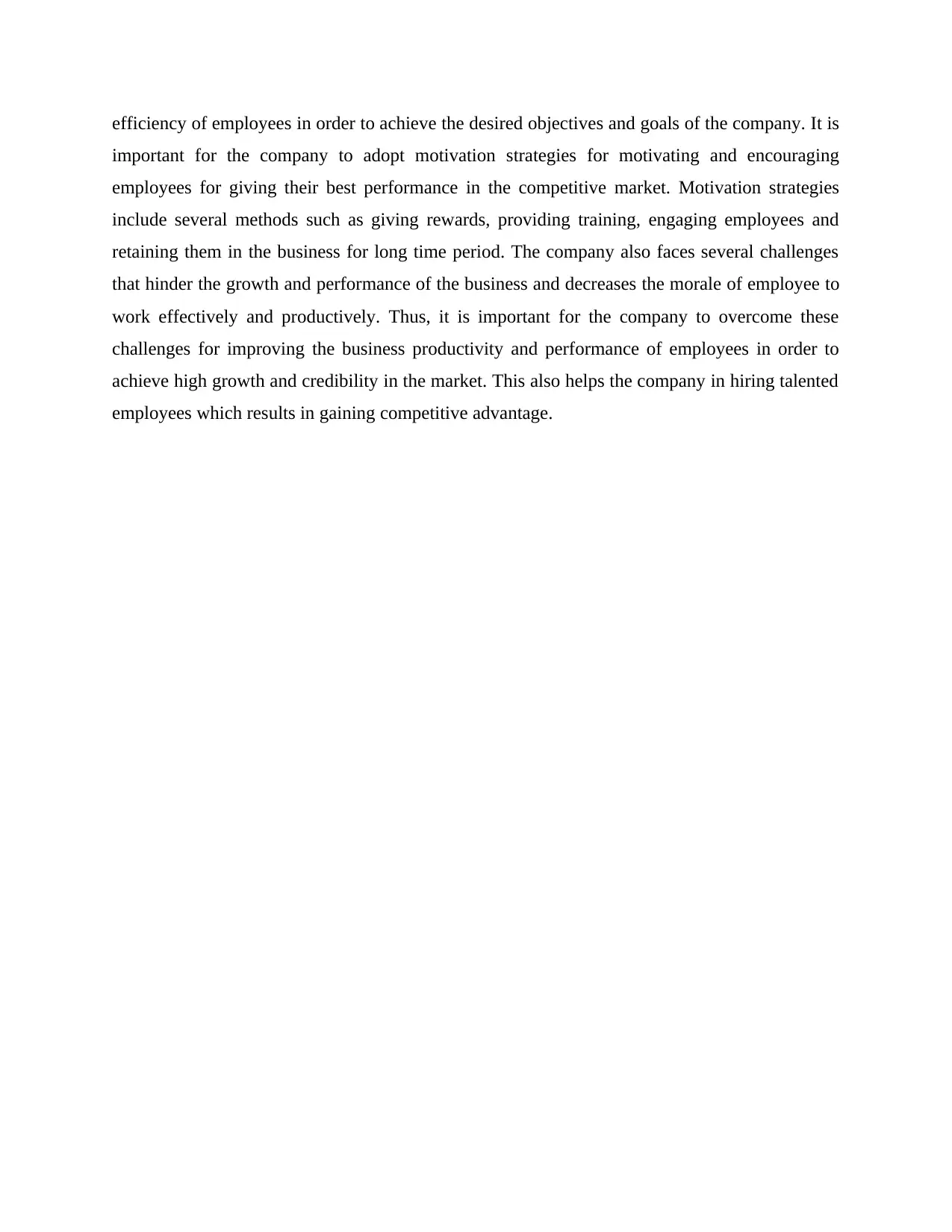
efficiency of employees in order to achieve the desired objectives and goals of the company. It is
important for the company to adopt motivation strategies for motivating and encouraging
employees for giving their best performance in the competitive market. Motivation strategies
include several methods such as giving rewards, providing training, engaging employees and
retaining them in the business for long time period. The company also faces several challenges
that hinder the growth and performance of the business and decreases the morale of employee to
work effectively and productively. Thus, it is important for the company to overcome these
challenges for improving the business productivity and performance of employees in order to
achieve high growth and credibility in the market. This also helps the company in hiring talented
employees which results in gaining competitive advantage.
important for the company to adopt motivation strategies for motivating and encouraging
employees for giving their best performance in the competitive market. Motivation strategies
include several methods such as giving rewards, providing training, engaging employees and
retaining them in the business for long time period. The company also faces several challenges
that hinder the growth and performance of the business and decreases the morale of employee to
work effectively and productively. Thus, it is important for the company to overcome these
challenges for improving the business productivity and performance of employees in order to
achieve high growth and credibility in the market. This also helps the company in hiring talented
employees which results in gaining competitive advantage.
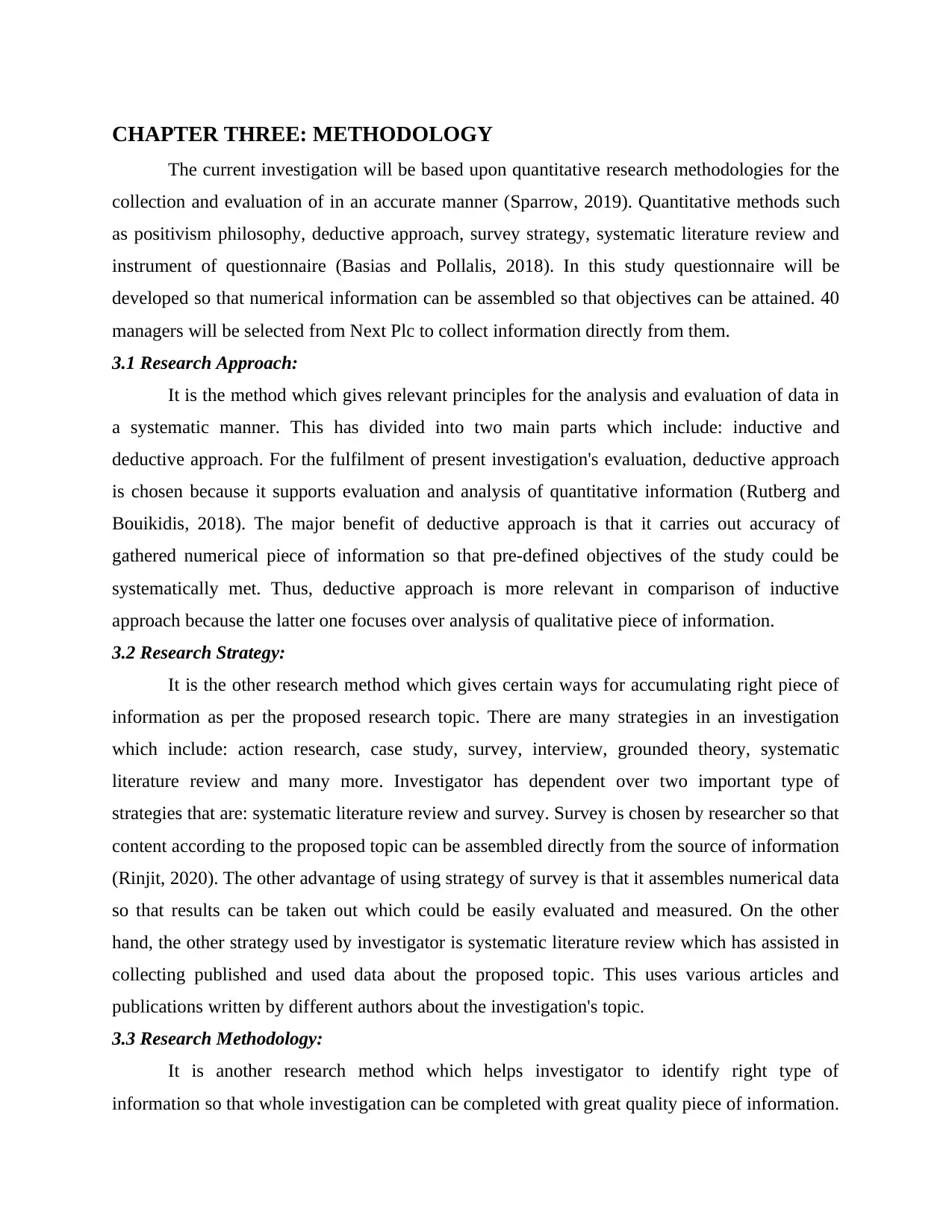
CHAPTER THREE: METHODOLOGY
The current investigation will be based upon quantitative research methodologies for the
collection and evaluation of in an accurate manner (Sparrow, 2019). Quantitative methods such
as positivism philosophy, deductive approach, survey strategy, systematic literature review and
instrument of questionnaire (Basias and Pollalis, 2018). In this study questionnaire will be
developed so that numerical information can be assembled so that objectives can be attained. 40
managers will be selected from Next Plc to collect information directly from them.
3.1 Research Approach:
It is the method which gives relevant principles for the analysis and evaluation of data in
a systematic manner. This has divided into two main parts which include: inductive and
deductive approach. For the fulfilment of present investigation's evaluation, deductive approach
is chosen because it supports evaluation and analysis of quantitative information (Rutberg and
Bouikidis, 2018). The major benefit of deductive approach is that it carries out accuracy of
gathered numerical piece of information so that pre-defined objectives of the study could be
systematically met. Thus, deductive approach is more relevant in comparison of inductive
approach because the latter one focuses over analysis of qualitative piece of information.
3.2 Research Strategy:
It is the other research method which gives certain ways for accumulating right piece of
information as per the proposed research topic. There are many strategies in an investigation
which include: action research, case study, survey, interview, grounded theory, systematic
literature review and many more. Investigator has dependent over two important type of
strategies that are: systematic literature review and survey. Survey is chosen by researcher so that
content according to the proposed topic can be assembled directly from the source of information
(Rinjit, 2020). The other advantage of using strategy of survey is that it assembles numerical data
so that results can be taken out which could be easily evaluated and measured. On the other
hand, the other strategy used by investigator is systematic literature review which has assisted in
collecting published and used data about the proposed topic. This uses various articles and
publications written by different authors about the investigation's topic.
3.3 Research Methodology:
It is another research method which helps investigator to identify right type of
information so that whole investigation can be completed with great quality piece of information.
The current investigation will be based upon quantitative research methodologies for the
collection and evaluation of in an accurate manner (Sparrow, 2019). Quantitative methods such
as positivism philosophy, deductive approach, survey strategy, systematic literature review and
instrument of questionnaire (Basias and Pollalis, 2018). In this study questionnaire will be
developed so that numerical information can be assembled so that objectives can be attained. 40
managers will be selected from Next Plc to collect information directly from them.
3.1 Research Approach:
It is the method which gives relevant principles for the analysis and evaluation of data in
a systematic manner. This has divided into two main parts which include: inductive and
deductive approach. For the fulfilment of present investigation's evaluation, deductive approach
is chosen because it supports evaluation and analysis of quantitative information (Rutberg and
Bouikidis, 2018). The major benefit of deductive approach is that it carries out accuracy of
gathered numerical piece of information so that pre-defined objectives of the study could be
systematically met. Thus, deductive approach is more relevant in comparison of inductive
approach because the latter one focuses over analysis of qualitative piece of information.
3.2 Research Strategy:
It is the other research method which gives certain ways for accumulating right piece of
information as per the proposed research topic. There are many strategies in an investigation
which include: action research, case study, survey, interview, grounded theory, systematic
literature review and many more. Investigator has dependent over two important type of
strategies that are: systematic literature review and survey. Survey is chosen by researcher so that
content according to the proposed topic can be assembled directly from the source of information
(Rinjit, 2020). The other advantage of using strategy of survey is that it assembles numerical data
so that results can be taken out which could be easily evaluated and measured. On the other
hand, the other strategy used by investigator is systematic literature review which has assisted in
collecting published and used data about the proposed topic. This uses various articles and
publications written by different authors about the investigation's topic.
3.3 Research Methodology:
It is another research method which helps investigator to identify right type of
information so that whole investigation can be completed with great quality piece of information.
⊘ This is a preview!⊘
Do you want full access?
Subscribe today to unlock all pages.

Trusted by 1+ million students worldwide
1 out of 33
Related Documents
Your All-in-One AI-Powered Toolkit for Academic Success.
+13062052269
info@desklib.com
Available 24*7 on WhatsApp / Email
![[object Object]](/_next/static/media/star-bottom.7253800d.svg)
Unlock your academic potential
Copyright © 2020–2026 A2Z Services. All Rights Reserved. Developed and managed by ZUCOL.




